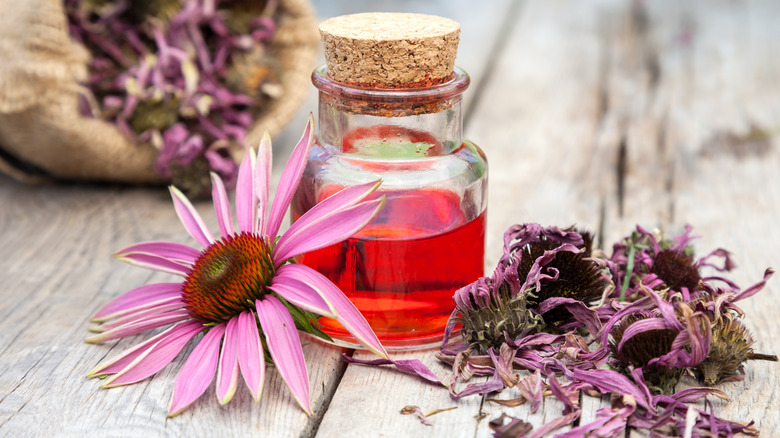What Is Echinacea And Can It Really Help With A Cold?
Echinacea is a perennial herb in the daisy family (via National Science Foundation). Also called purple coneflower or simply coneflower, most people recognize the pale pinkish-purple petals of this native American plant. However, Gardener's Path says echinacea flowers grow in many shades, including white, yellow, orange, red, and hot pink. Although nine species of echinacea are known to exist, only three of them are commonly included in dietary supplements, including cold remedies.
The National Center for Complementary and Integrative Health (NCCIH) explains that supplements usually use either Echinacea purpurea or Echinacea angustifolia in supplements, but sometimes they may contain Echinacea pallida. These species' pale lavender to bright purple hue and tall, spiky, conical seed head mark these plants as the echinaceas used in herbal remedies.
Mount Sinai calls echinacea one of the most popular herbs in America today. Archaeological evidence suggests Native Americans have used echinacea for over 400 years as a general "cure-all," particularly to heal wounds and infections. And during the 18th and 19th centuries, people commonly used the herb to treat malaria, syphilis, diptheria, blood poisoning, and scarlet fever. But can echinacea really help with a cold?
Using echinacea may protect you from catching a cold
The common use of echinacea became less popular in the United States after the invention of antibiotics in the 20th century. At the same time, echinacea gained popularity in Germany, and much of our current scientific findings around the herb's benefits come from Germany (via Mount Sinai).
Today, echinacea is a popular herbal supplement used in complementary health practices. Proponents claim taking echinacea at the first sign of a cold can help shorten the duration of a cold. According to the NCCIH, many research trials have studied echinacea's effects on the common cold, with conflicting results.
A 2007 study published in The Lancet found echinacea decreased the odds of developing a common cold by 58% and reduced the duration of a cold by 1.4 days. But a 2014 review in the Cochrane Database of Systematic Reviews concluded that echinacea products produced no significant benefits for treating the common cold. Although, the study did admit there may be some benefits from echinacea products. However, echinacea's true cold-fighting benefits may lie in prevention.
A 2016 study in Holistic Nursing Practice revealed that taking echinacea, specifically Echinaforce, as a prophylactic did reduce the total number of cold episodes, the number of days with cold symptoms, and the severity of cold symptoms.


